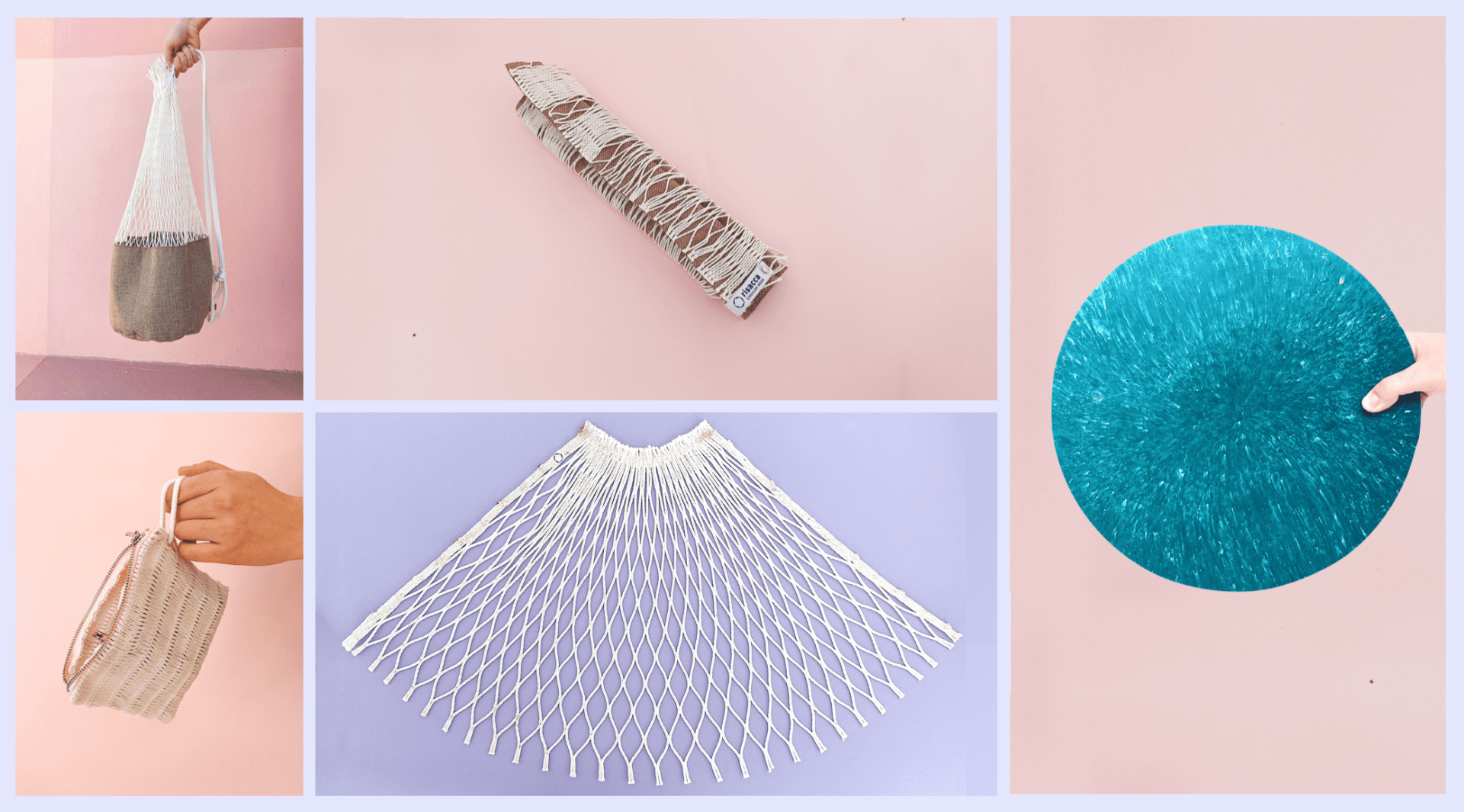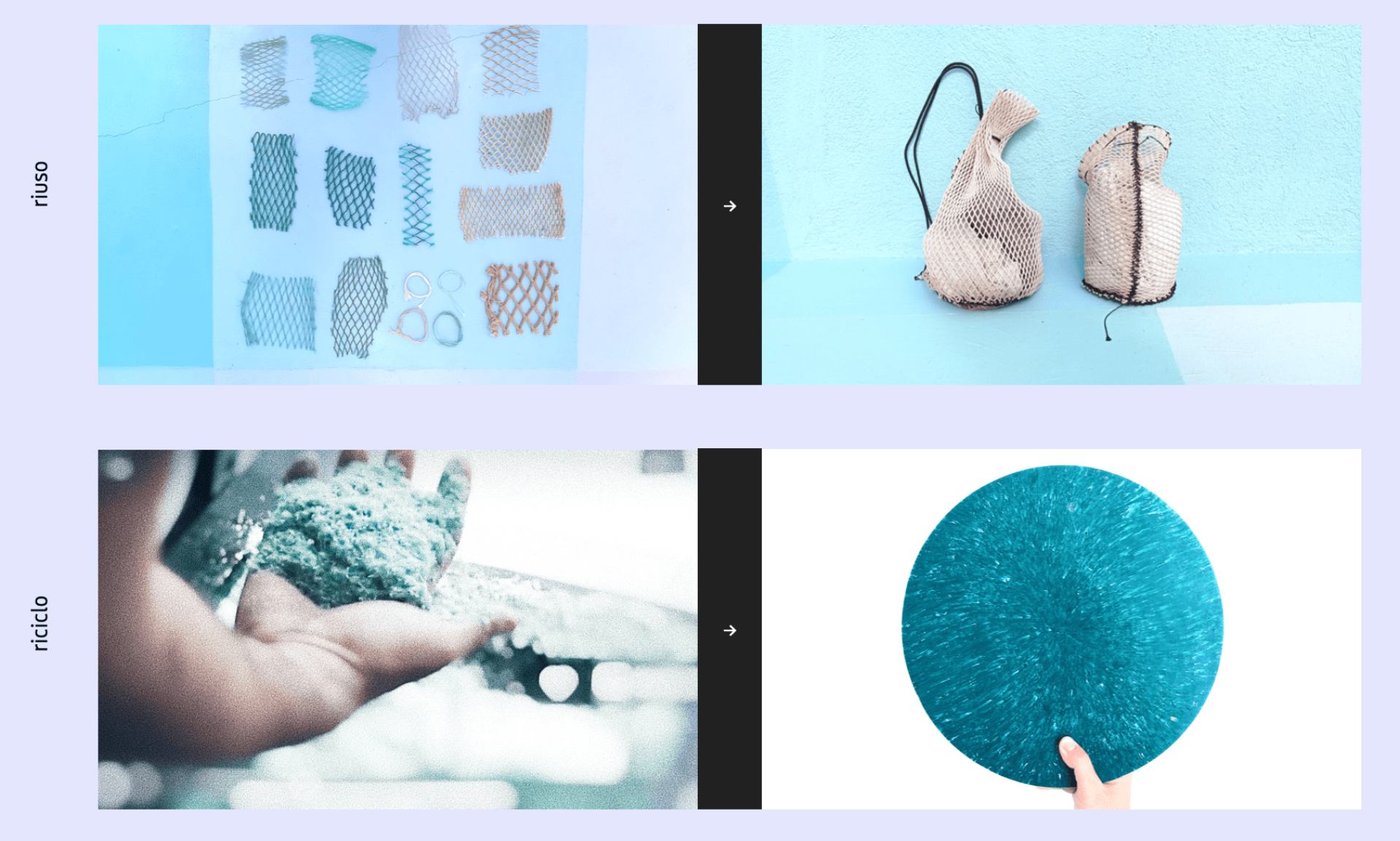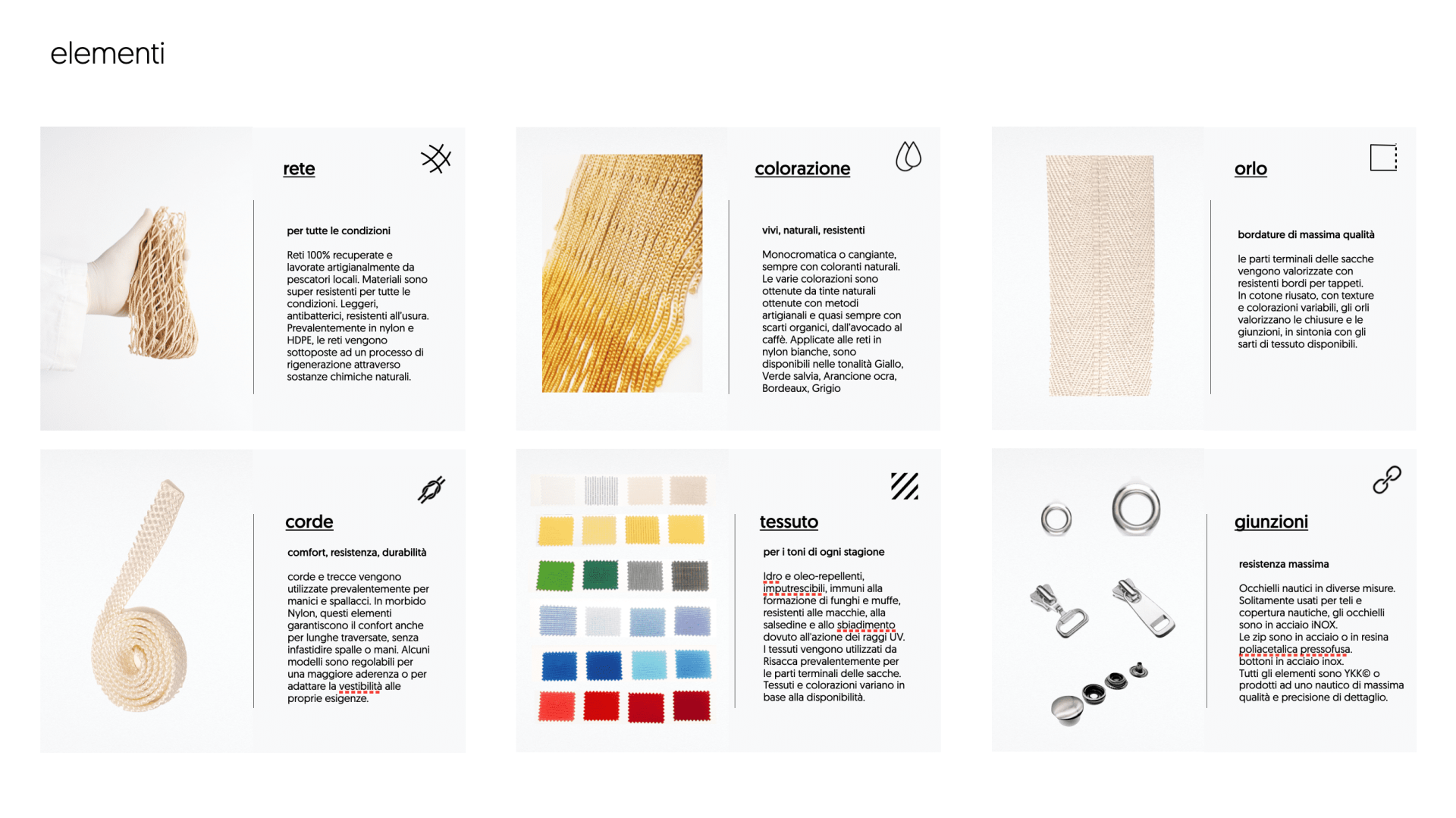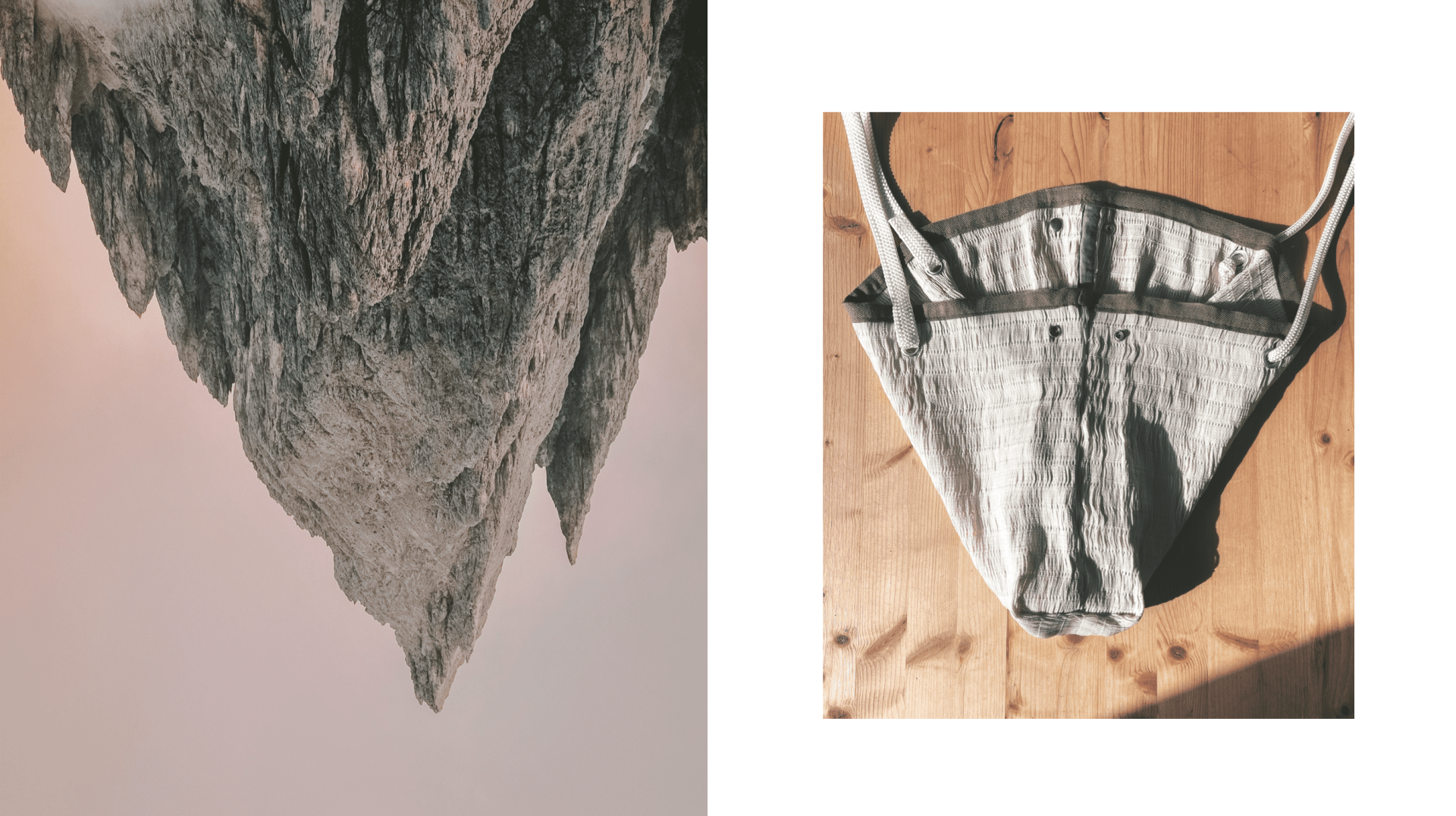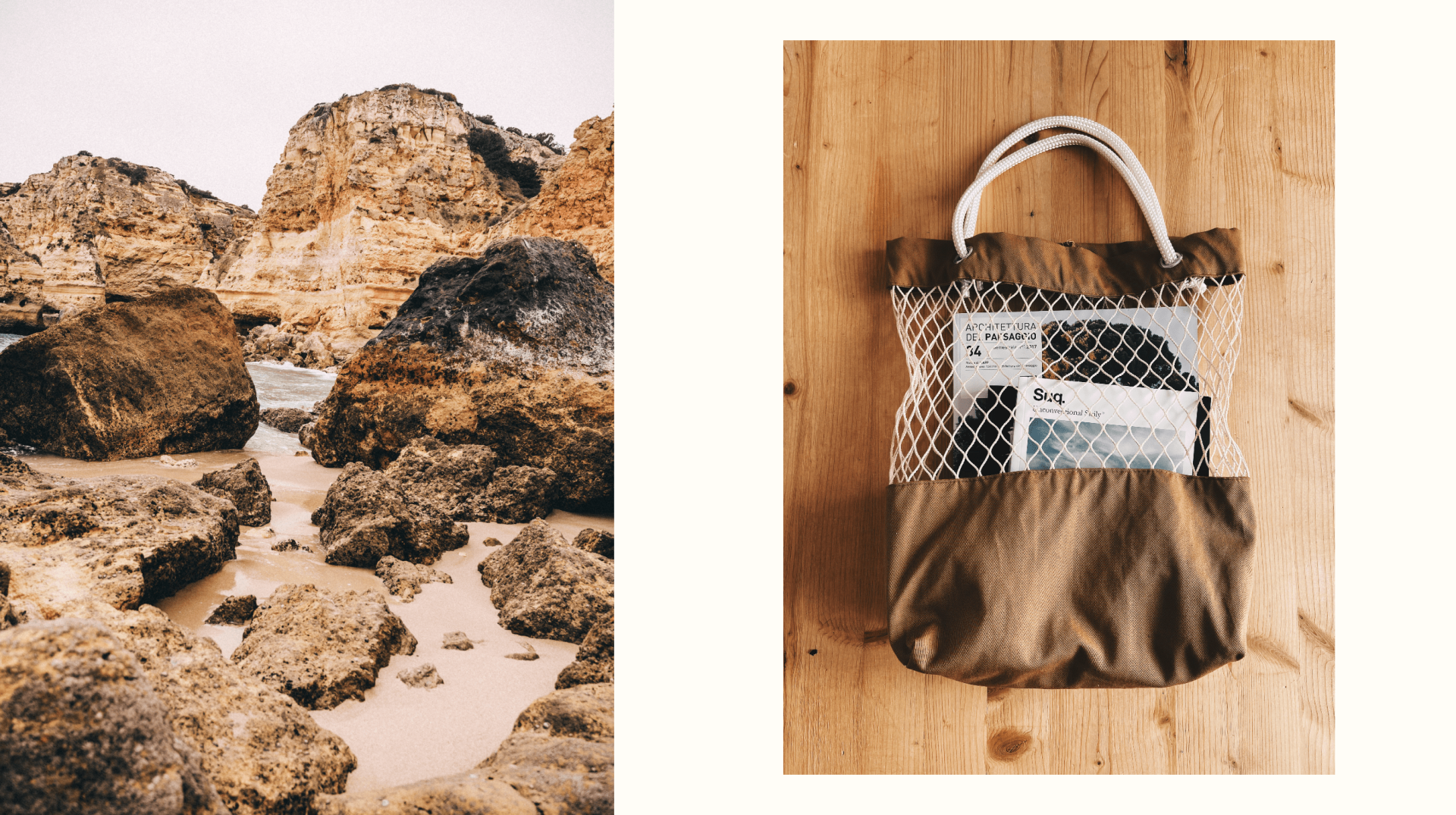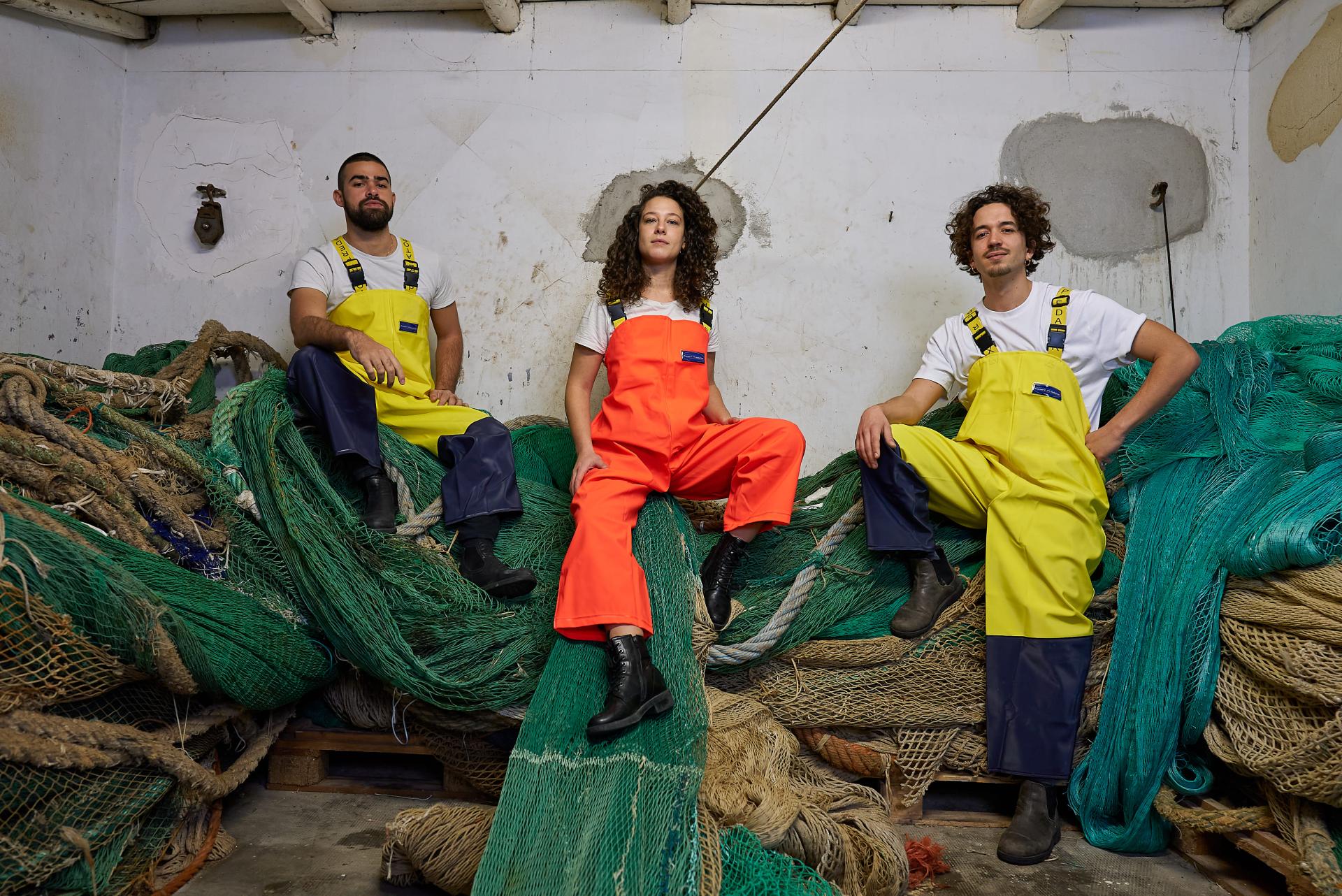Risacca - Circular Wear
Basic information
Project Title
Full project title
Category
Project Description
We are a brand of fashion and sustainable design products ethically produced born from the regeneration of fishing nets, textile waste and plastic waste recovered. Community products, made by local artisans, which activate processes of reuse and recycling of discards from the fishing industry and of plastics recovered from the sea.
Geographical Scope
Project Region
Urban or rural issues
Physical or other transformations
EU Programme or fund
Which funds
Description of the project
Summary
Risacca is a circular and blue economy project that aims to promote innovative solutions on the reuse and recycling of waste - mostly from the fishing industry - producing territorial development through reuse and recycling. We are a brand of fashion and sustainable design products ethically produced born from the regeneration of fishing nets, textile waste and plastic waste recovered. Community products, made by local artisans, which activate processes of reuse and recycling of discards from the fishing industry and of plastics recovered from the sea, making new opportunities for young people and craftsmen and regenerating the social and cultural fabric by creating a sensitive community that participates in the protection of the marine ecosystem.
Risacca is a design and research studio on the reuse and recycling of waste within the circular and blue economy approach.
The project takes place in Mazara del Vallo (Italy, Sicily, TP) mostly known for the trade in fresh fish: up until 20 years ago was the third largest port in Europe. In recent years the fishing industry has experienced a serious socio- economic crisis, witnessing a decrease in the fleet -from about 500 to about 100 vessels- resulting in a drastic increase in unemployment (+30%).
The background to this social drama is the use since the 70s of plastic materials that do not have a clear regulation on disposal, becoming a burden on the economies of fishermen who are forced to take on the charge of disposal or to resort to illegal methods. In this context and following a close dialogue with local fishermen, the Risacca project was born to promote the reuse and recycling of fishing nets, create opportunities for young people and artisans, regenerate the socio-cultural fabric.
Key objectives for sustainability
In the report of Ghost Gear: The Abandoned Fishing Nets Haunting Our Oceans, every year more than 640 thousand tons of plastic material used in commercial fishing is thrown into the sea. A recent study on the Great Pacific Garbage Patch revealed that the pile of waste located in the Pacific Ocean is made of 46% of fishing nets. In 2018, it was estimated that up to 650,000 marine animals are killed each year by ghost nets.
Illegal disposal is facilitated by the lack of discipline in waste management: fishing nets are not assigned a EWC code (European Waste Catalogue), which makes it difficult for fishermen to be able to dispose of it properly, take charge of disposal is often too expensive for small businesses and often unsuitable methods are used to get rid of the waste.
The fishing industry in Mazara del Vallo produces about 30.000 kg of plastic waste in just one year.
We intend to create a community lab of technological innovation and research for the regeneration of all plastic wastes from the fishing industry through a systemic approach summarized in 5R defining our process: recover, repair, regenerate, reuse, recycle.
recover - management and disposal of fishing nets, thus avoiding the ghost nets phenomenon;
repair - mend any perforations to make them suitable for an unconventional uses such as the production of bags and other objects, through the artisanal techniques of fishermen;
regenerate - making fishing nets reusable through a decontamination process;
reuse - 70% of regenerated nets will be shaped and woven for the production of bags, accessories and other products;
recycle - the remaining 30% consisting of shreds, production wastes and the plastic recovered from the sea will be recycled through partnerships with national companies and through machinery for the recycling of plastic, at local level creating products that can be reused in the fisheries sector and for coastal experience.
Key objectives for aesthetics and quality
The first collection of Risacca products is a line of durable bags, light and versatile, foldable, suitable for coastal excursions, products from the sea to the sea, but also for nature excursions, urban trekking and everyday life, co-created with local fishermen and artisans.
Products are designed adopting and renewing a traditional technique of repairing nets, passed from generation to generation: thanks to this artisanal technique bags and accessories with nets will always be different to one another in color and texture, unique and unrepeatable pieces, adapting wastes and shreds no longer usable for fishing.
In Risacca’s products the shape follows the function, but the function is not only to contain and transport objects but to contain and carry a message of sustainability, inclusion, social and environmental redemption and to contain and transport the story of one of the oldest human activities - fishing - with all the criticality that brings with it in its contemporary evolution, but also the history of a territory, of a context and a community from which it comes, and the history of an ancient technique that can thus continue to be handed down.
Supporting the Risacca project means promote the safeguard marine ecosystems, generating a sense of belonging to a local and international community: Risacca supports local crafts, fragile subjects, tells the stories about fishermen, sea and the city of Mazara facilitating the exchange of knowledge and experience between national and international supporters, visitors and locals by building partnerships with international organizations that support the protection of marine ecosystems (Healthy seas, WWF, Greenpeace, 4oceans...).
Buying Risacca means supporting our cause of protecting the seas and the social fabric and their biodiversity, respecting ecosystems and helping people in difficulty.
Key objectives for inclusion
For the past 10 years the port of Mazara has been abandoned. The socio-economic crisis has caused a reduction in the fleet, which has gone from about 500 to about 100 fishing vessels, resulting in a drastic increase in unemployment and a decline in related income: from ten years to now, is estimated that 3,100 people have lost their jobs and the entire sector has suffered a recession in the market value of 30%. In the fishing industry the classic generational turnover has no longer taken place and the sector is collapsing.
Risacca wants to contribute to put an emphasis on the topic, restoring charm to the ancient traditional techniques, bringing to Mazara and the port the creative and scientific capital establishing high levels of innovation. We aim to create new job opportunities for local workers and fragile subjects in the Mazara area (young unemployed, craftsmen, migrants, disabled) in collaboration with other organisations pursuing a social purpose, generating a new source of income for fishing companies on the recovery and recycling of waste and plastic collected at sea.
Nets and other plastic materials, now seen as waste, will become a new opportunity for the fisheries sector that will be able to diversify its offer. We aim to generate up to 8 new jobs in the first 2 years: 3 artisans (2 fishnets, 1 tailor/a); 3 operators involved in the recovery and selection of plastic and ghost nets on vessels; 2 operators for transport, storage and cleaning of recovered networks.
Then, the community lab dedicated to the recycling of plastic inside the port will be presented as an opportunity for research and experimentation for young people, designers or experts and creative and as a training center through meetings, events, training courses with schools and associations aiming at the creation of a community involved, conscious and sensitive to the theme of recycling and protection of marine ecosystems.
Results in relation to category
We have adapted the circular approach to the phenomenon of fishing nets by designing and defining each phase of the product collection, regeneration and transformation process.
The new circular economy projects show that industrial ecology and short supply chains can contribute - in particular on a territorial scale - to a true sustainable development.
In contrast to the linear model of "take-do-dispose" of resources, the circular industrial model allows us to optimize the use of resources and reduce or eliminate waste, basing our lifestyle on key actions such as reuse , repair, sustainable sourcing and responsible consumption.
Those of Risacca are community products aimed at an ethically positioned public and beyond. Working with luxury brands, our goal is to be able to raise awareness through constant communication at all stages of knowledge, purchase, reception, use of the product, in order to promote awareness of how daily life, consumption style and choosing an ethical fashion brand can affect the environment.
Thanks to the first year of activity, we were able to measure the impact generated for each ton of fishing nets fed into the transformation process. With a ton of nets, Risacca products are obtained for a value of about € 300,000 between reuse and recycling, whose production costs, which affect 25% (€ 75,000), create a totally new profit on the local context. From a ton we can generate an average of 3000 medium-sized products, which are promoted in co-marketing with luxury brands in fashion and design, towards a pool of tens of thousands of users.
How Citizens benefit
Risacca project was born following a close dialogue with local fishermen, entrepreneurs and artisans in Mazara del Vallo. Through an iterative process, we collected data e infos about materials, waste management, while prototyping new product through reuse and recycle methods.
We have designed new relationships between people, activities and resources of our territory, in order to enhance the culture and local identity and produce sustainable development and collective well-being. Afterwards we have designed and tested a circular process where waste can be reused in other production processes generating environmental and social impact. The process is structured in 5 R: repair, reduce, regenerate, recycle, reuse .
We begins to define the process by working on discarded fishing nets, which represent one of the most present elements in seas and oceans and whose disposal weighs on the economies of fishermen.
Through collaborations with fishing companies and associations, we recover the nets before they become a waste, fighting the phenomenon of abandonment and so-called ghost nets.
The nets are then regenerated through a process tested by the team, differentiated according to the material, color, mesh size, level of wear. 70% of nets is destined for reuse in social tailoring, combining it with scraps recovered from a textile industry, made in collaboration with local artisans and workers for the production of bags, clothing and accessories. 30% is for recycling in the Risacca lab where, through semi-industrial machinery, the nets are recycled with other plastic waste recovered by the coast and transformed into new products, furniture, objects, gadgets.
Local community was the first to test the beta collection products in summer 2021. Furthermore, once the first phase of research was completed, we launched a crowdfunding to finance the birth of our first social tailoring, raising over 17,000 euros from around 100 supporters.
Physical or other transformations
Innovative character
Risacca meets 4 of the 17 SDGs - decent work and economic growth (8), responsible consumption and production (12), acting for the climate (13), underwater life (14). Our mission is to safeguard marine ecosystems giving second life to fishing nets and plastic materials. We have designed a reuse and recycling process that can transform 90% of the material collected from the main suppliers into clothing or sustainable design. Our project can support growth by increasing economic productivity and creating decent jobs. We have chosen to produce locally to combat forced labor. Furthermore, we aim to achieve higher levels of economic productivity through diversification, technological updating and innovation (8.2), untying economic growth from environmental degradation (8.4) for growth that does not take place at the expense of the environment.
Risacca passes from sustainable management and efficient use of natural resources (12.2), significantly counteracting the release of waste into the air, water and soil, in order to minimize their negative impacts on human health and the environment (12.4), and reduces substantially the production of waste through prevention, reduction, recycling and reuse (12.5). These actions are useful to combat climate change and its consequences. Our actions follow a sustainably use the oceans, seas and marine resources for sustainable development (14) to prevent and significantly reduce marine pollution of all types (14.1); sustainably manage and protect marine and coastal ecosystems (14.2).
Risacca is a scalable project, designed to be easily replicated. We want to export our project in every port, to insert a container for the recycling of fishing nets and plastic materials recovered at sea, creating jobs and environmental impact in all coastal cities.
Learning transferred to other parties
Through our research we have deeply examined several existing circular economy and blue economy projects and successful case studies, measuring their real socio-economic, environmental and cultural impact. We have found that in many cases the perceived impact does not correspond to the real one: some use a very low percentage of reused/recycled material (some close to 10%); others produce at low costs outsourcing production at the expense of protections at work, they do not trigger processes of territorial development locally. In other analyzed competitors, recycled materials is transformed into composite product no longer recyclable at the end of life, others are limited to partial reuse rather than recycling or vice versa.
- “Verdura shoes” Handmade production of shoes and accessories with recovered fishing nets. Local production, high spending target, limited recovery of waste.
- ”The other bag Bags”, bags made with Econyl, recycled nylon. TOB is an exemplary case of how many of our competitors operate: they don't recover waste but buy the Econyl thread and has new products produced externally. Their communication is focused on sustainability, however, if we analyze the life cycle of Econyl material for example, the product is made in Asia, then shipped to Australia to be branded, packed and shipped again. Far from a sustainability process.
- “Bluecycle.official” greek start up which aims to recycle plastic waste generated by the fishing industry to produce new products. About 50% of the materials they recycle come from recycled plastic from the fishing industry.
Risacca is a circular project, scalable and achievable at local level, without overproduction, enhancing the workforce and local resources, generating new jobs and articulating the intervention on both reused recycling generating social and environmental impact. Risacca products use a high percentage (90%) of reused or recycled material.

